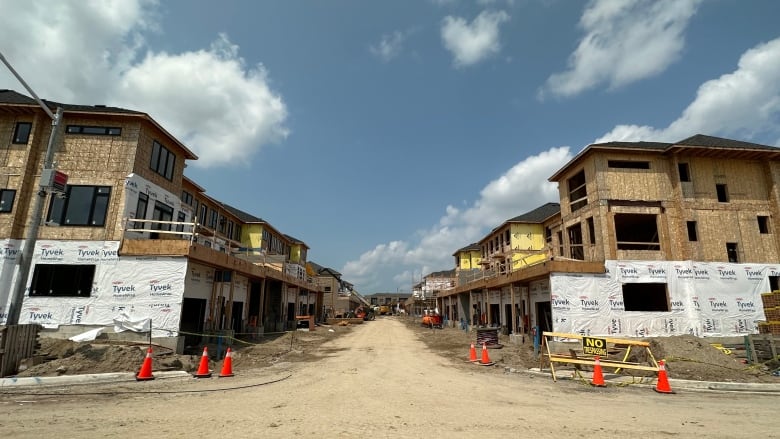Here’s how each Ontario city is doing on hitting provincial targets for building new homes
Nearly all cities in Ontario must dramatically pick up the pace if they hope to hit the targets set by Premier Doug Ford’s government, the latest housing construction figures show.
A year and half ago, Ford’s Progressive Conservatives set the goal of 1.5 million new homes to be built in Ontario over the course of a decade, and laid down specific housing targets for 29 of the province’s largest and fastest-growing municipalities to hit by 2031.
Now trends are emerging, with some cities faring far better than others at being on track to achieve their benchmarks for getting new homes built.
Comparing Canada Mortgage and Housing Corp. (CMHC) statistics on new home construction starts from January 2022 to June 2023 against the province’s 10-year targets for each city provides a measure of how close each city is to its needed pace.
Among Ontario’s largest cities, Toronto leads the way, with new home starts since January 2022 running at about 90 per cent of the pace needed to reach the goal of 285,000 new homes in 10 years. Vaughan has the next best score among big cities, at 84 per cent.
Most other large cities — including Ottawa, Hamilton, London, Kitchener and Markham — are proceeding at roughly 50 to 65 per cent of the target pace.

By contrast, Mississauga and Brampton, at 29 per cent and 23 per cent respectively, are so far behind that the two Peel Region cities will need to roughly quadruple the rate of new construction to get on track.
At the very bottom of the list: Burlington, which has seen just 208 housing starts in the past year and a half, roughly five per cent of what would be needed to hit its target of 2,900 new homes per year
Interest rates, labour crunch are factors
Among smaller cities, Brantford, Pickering and Barrie are at the top of the list for housing starts relative to their provincial targets.
Economist Mike Moffatt of the Smart Prosperity Institute, a think tank based at the University of Ottawa, is tracking the pace of home building in Ontario. While Moffatt says municipalities’ willingness to allow new construction has an impact, he also believes other factors — such as higher interest rates and shortages of construction labour — are restraining the number of new housing starts.
“I think all three orders of government along with the [housing development] sector need to start doing some deep dives, figuring out why these buildings aren’t getting built, making the necessary changes and getting some shovels in the ground,” Moffatt said in an interview.
CMHC figures show 44,002 new housing starts in Ontario from January to June of this year, an increase of nearly 10 per cent over the same period in 2022. There were 96,080 new housing units started in all of 2022, the first year of the Ford government’s 10-year time frame for its home construction target. .

To have any realistic hope of achieving the goal, Moffatt says Ontario needs to ramp up to an annual pace of 150,000 new housing units roughly by year four of the plan, which would be 2025.
“Every order of government needs to raise its game right now or we’re not going to hit 1.5 million homes in 10 years,” he said.
Private sector projections cited in the Ford government’s 2023 budget forecast no more than 83,000 new housing starts in any year until 2026.
When the Ford government began laying the groundwork for its housing plan, the premier and his ministers laid much of the blame for the slow pace of home construction on city councils not approving projects quickly enough.
There’s been pushback against that argument. Planners across Ontario estimate that developers have yet to start work on some 1.25 million housing units that are already approved for construction.
Tale of 2 cities: Barrie & Burlington
Developers’ decisions could in part explain the vast differences in housing starts between Burlington and Barrie since January 2022. They are similar-sized cities, with similar 10-year-housing targets (29,000 for Burlington, and 23,000 for Barrie). Yet construction has begun on more than 3,000 new homes in Barrie since the beginning of last year, nearly 15 times as many as Burlington’s 208.

Burlington Mayor Marianne Meed Ward says the CMHC’s housing start numbers don’t tell the full story of development in her city.
“We can’t force developers to put shovels in the ground,” Meed Ward said in an interview. “I do think there are larger issues at play and I think it’s unfortunate that municipalities were made the sole scapegoat.”
Meed Ward says there are 29,000 housing units under review in Burlington, equivalent to the province’s 10-year target for home construction in the city.
“Those are going to start coming online very quickly in the next few years … .so we will meet our target by 2031 in terms of issuing those approvals,” she said.
Burlington has fully approved building permits for thousands of housing units on which developers haven’t started construction, Meed Ward said
In Barrie, Mayor Alex Nuttall credits city planning staff as a key reason for the pace of home construction.

“We try to make it as easy to get through the process as possible,” Nuttall said in an interview at Barrie city hall.
“We’ve been working very hard focusing on approving units, on ensuring they get through all of the various stages of the planning process, getting the permits out the door to be able to start building.”
Barrie’s target is 23,000 new homes in a decade. Nuttall says the city has already approved more than 17,000 housing units and estimates it will hit its approval targets within the next two to three years.
“If anything, I think the provincial target for the city of Barrie is quite conservative,” he said.
Like his counterpart in Burlington, Nuttall says Barrie also faces some situations where housing projects have been approved yet construction hasn’t started.
A spokesperson for Municipal Affairs and Housing Minister Steve Clark says while Ontario is making progress toward its housing goals, there is still more work to do.
“Tackling the housing supply crisis is a joint effort that takes all levels of government, including our municipal partners,” said Clark’s press secretary Victoria Podbielski in an email to CBC News.
“While we recognize that it will take time to increase housing starts to the rate Ontarians need and deserve, we also need all municipalities to use the tools at their disposal now to begin increasing their local housing starts without delay,” Podbielski said.









Redes Sociais - Comentários